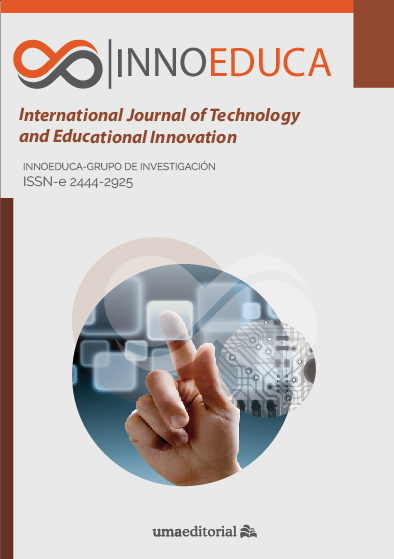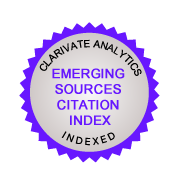JUSECA: A SERIOUS GAME FOR THE COMPREHENSION OF ALGORITHMS
DOI:
https://doi.org/10.24310/innoeduca.2022.v8i1.8465Keywords:
algorithms, educational games, learning modalities, computer programming, universitiesAbstract
The understanding of algorithms is one of the difficulties for students in university-level introductory programming courses. Although there are already strategies to stimulate the understanding of algorithms, a strategy that meets the needs of the subject “Programming 1” at the University of Los Andes was not found. Therefore, a serious game oriented towards this subject is proposed in this study for the understanding of algorithms, applying the ADDIE (Analysis, Design, Development, Implementation, and Evaluation) methodology. The Analysis, Design, and Development phases focused on the construction of JUSECA (Serious Game for the Comprehension of Algorithms); in the Implementation phase, the game was distributed to a group of students; and in the Evaluation phase, an ad hoc test was administered to evaluate the understanding of algorithms, and MEEGA+ (Model for the Evaluation of Educational Games) was applied to evaluate the students’ experiences and the usability of the game. On the one hand, the results of the ad hoc test showed that the game prompted students to correctly solve the easiest algorithm. On the other hand, the results of MEEGA+ indicated that the game moderately meets the requirements of an educational game
Downloads
Metrics
Publication Facts
Reviewer profiles N/A
Author statements
Indexed in
-
—
- Academic society
- N/A
- Publisher
- Universidad de Málaga
References
Alcid, A. S., Bandril, L. B. P., De Guzman, A. E., & Lopez, L. J. C. (2017). Analysis, Design, Development, Implementation, and Evaluation of a Serious Game Designed to Inform Users on Environmental Issues. International Journal of Computing Sciences Research, 1(1), 11-23. https://doi.org/10.25147/ijcsr.2017.001.1.01
Butler, Y. G. (2014). The use of computer games as foreign language learning tasks for digital natives. System, 54, 91-102. https://doi.org/10.1016/j.system.2014.10.010
Calderón, A., Petri, G., Ruiz, M., & von Wangenheim, C. G. (2019). Juegos serios para formar en los conceptos del lenguaje C: una experiencia en Fundamentos de Informática. Actas de las JENUI, 4, 199-206.
Cano, S., Arteaga, J.M., Collazos, C.A., González, C.S., & Zapata, S. (2016). Toward a methodology for serious games design for children with auditory impairments. IEEE Latin America Transactions, 14(5), 2511- 2521. https://doi.org/10.1109/TLA.2016.7530453
Carrillo, L, M., Gómez V, E., & Orozco M, J. (2017). Estrategia para la enseñanza de algoritmos y programación en ingeniería mediante el uso de la lúdica como herramientas TIC. Encuentro Internacional de Educación en Ingeniería. https://acofipapers.org/index.php/eiei/article/view/569
Castro, C., Muñoz, J., & Brazo, A. (2018). El uso de videojuegos serios en el aprendizaje de francés en educación superior. Revista Mexicana de investigación educativa, 23(76), 157-177.
Cuesta, L. (2010). The Design and Development of Online Course Materials: Some features and Recommendations. Porfile Issues in Teachers Preofessional Development, 12(1), 181-201.
Charsky, D. (2010). From edutainment to serious games: A change in the use of game characteristics. Games and culture, 5(2), 177-198. https://doi.org/10.1177/1555412009354727
Fava, L. A., Schiavoni, M. A., Rosso, J., Falcone, A. C., & Ronconi, L. (2016, 3-7 de cotubre). ALGOLIPSE: una herramienta educativa para mejorar la comprensión de algoritmos y estructuras de datos [Comunicación congreso]. XXII Congreso Argentino de Ciencias de la Computación (CACIC 2016) (pp. 1280-1290), San Luis, Argentina. http://sedici.unlp.edu.ar/handle/10915/55718
Garcia-Iruela, M., & Hijón-Neira, R. (2017, 7-9 de junio). Experiencia de juegos serios en el aula de formación profesional [Comunicación congreso]. V Congreso Internacional de Videojuegos y Educación. (CIVE, 2017), Lleida, España. http://riull.ull.es/xmlui/handle/915/6682
Gugerty, L., & Olson, G. (1986). Debugging by skilled and novice programmers. ACM SIGCHI Bulletin, 17(4), 171-174. https://doi.org/10.1145/22627.22367
Hernández Sampieri, R., Fernández Collado, C., & Baptista Lucio, P. (2010). Metodología de la investigación. MCGRAW-HILL.
Kazimoglu, C., Kiernan, M., Bacon, L., & MacKinnon, L. (2012). Learning programming at the computational thinking level via digital game-play. Procedia Computer Science, 9, 522-531. https://doi.org/10.1016/j.procs.2012.04.056
Koch, M., Von Luck, K., Schwarzer, J., & Draheim, S. (2018). The Novelty Effect in Large Display Deployments-Experiences and Lessons-Learned for Evaluating Prototypes. European Society for Socially Embedded Technologies (EUSSET), 2(1), 2510-2591. https://doi.org/10.18420/ecscw2018_3
Maldonado, F., García, M., & Bencomo, O. (2017). Los juegos serios y su influencia en el uso responsable de energía y cuidado del medio ambiente. Revista Universidad y Sociedad, 9(1), 129-136.
Miljanovic, M., & Bradbury, J. (2016). Robot ON!: A Serious Game for Improving Programming Comprehension. IEEE/ACM 5th International Workshop on Games and Software Engineering (GAS). https://doi.org/10.1145/2896958.2896962
Molenda, M. (2003). In search of the elusive ADDIE model. Performance Improvement, 42(5), 34-36. https://doi.org/10.1002/pfi.4930420508
Petri, G., Von Wangenheim, C. G., & Borgatto, A. F. (2018). MEEGA+, Systematic Model to Evaluate Educational Games. En N. Lee (Ed.), Encyclopedia of Computer Graphics and Games. https://doi.org/10.1007/978-3-319-08234-9_214-1
Pérez, J. (2019a). DINADI: una estrategia para el diagnóstico de nativos digitales en el ámbito universitario. Revista Paradigma, 40(1), 56-75.
Pérez, J. (2019b). El pensamiento computacional en la vida cotidiana. Revista Scientific, 4(13), 293-306. https://doi.org/10.29394/Scientific.issn.2542-2987.2019.4.13.15.293-306
Pérez, J., & Azuaje, M. (2019). LE1: una estrategia amistosa para un curso introductorio de programación. Revista Educación En Ingeniería, 14(28), 45-53. https://doi.org/10.26507/rei.v14n28.998
Pérez J., & Castro J. (2018a). Estímulo del razonamiento lógico mediante el juego Millonario en C para la asignatura “Programación 1”, Revista Tekhné, 21(3), 8-14.
Pérez J., & Castro J. (2018b). LRS1: Un robot social de bajo costo para la asignatura “Programación 1”, Revista Colombiana de Tecnologías de Avanzada, 2(32), 68-77.
Pérez J., & Pedroza O. (2018). LM1: una metodología de estudio para la asignatura “Programación 1”, Revista Educere, 22(73), 635-648.
Poy-Castro, R., Mendaña-Cuervo, C., & González, B. (2015). Diseño y evaluación de un juego serio para la formación de estudiantes universitarios en habilidades de trabajo en equipo. RISTI-Revista Ibérica de Sistemas e Tecnologias de Informação (spe3), 71-83. https://doi.org/10.17013/risti.e3.71-83
Plass, J. L., Heidig, S., Hayward, E. O., Homer, B. D., & Um, E. (2014). Emotional design in multi-media learning: Effects of shape and color on affect and learning. Learning and Instruction, 29, 128-140. https://doi.org/10.1016/j.learninstruc.2013.02.006
Ramalingam, V., & Wiedenbeck, S. (1997). An empirical study of novice program comprehension in the imperative and object-oriented styles. In Papers presented at the seventh workshop on Empirical studies of programmers, (pp. 124-139). ACM. https://doi.org/10.1145/266399.266411
Renavitasari, I. R. D., & Supianto, A. A. (2018). Educational Game for Training Spatial Ability Using Tangram Puzzle. In 2018 International Conference on Sustainable Information Engineering and Technology (pp. 174-179). SIET. https://doi.org/10.1109/SIET.2018.8693164
Rodero, C. L., Velasco, M. P., Iturbide, J. A. V., & Losada, I. H. (2017). Experiencia para la evaluación de VisBack, una herramienta para la visualización de algoritmos de backtracking. IE Comunicaciones: Revista Iberoamericana de Informática Educativa, (26), 82-93.
Rosanigo, Z. B., & Paur, A. B. (2006). Estrategias para la enseñanza de Algorítmica y Programación [Comunicación en congreso]. I Congreso de Tecnología en Educación y Educación en Tecnología.
Taipe, M. S. A., Pesántez, D. Á., Rivera, L., & Vizueta, D. O. (2017). Juegos Serios en el Proceso de Aprendizaje. UTCIENCIA, 4(2), 111-122.
Van Lankveld, G., Spronck, P., Van Den Herik, H. J., & Rauterberg, M. (2010). Incongruity-based adaptive game balancing. En H.J. van den Herik, & P. Spronck (Eds.), Advances in Computer Games. ACG 2009. Lecture Notes in Computer Science, 6048 (pp. 208-220). Springer. https://doi.org/10.1007/978-3-642-12993-3_19
Velázquez-Iturbide, J. Á., & Pérez-Carrasco, A. (2016). Systematic development of dynamic programming algorithms assisted by interactive visualization. En Proceedings of the 2016 ACM Conference on Innovation and Technology in Computer Science Education (pp.71-76). ACM. https://doi.org/10.1145/2899415.2899450
Von Wangenheim, C. G., Araújo E Silva De Medeiros, G, Missfeldt Filho, R., Petri, G., Da Cruz Pinheiro, F., Ferreira, M. N. F., & Hauck, J. C. (2019). SplashCode-A Board Game for Learning an Understanding of Algorithms in Middle School. Informatics in Education, 18(2), 259–280. https://doi.org/10.15388/infedu.2019.12
Williams, P., Schrum, L., Sangrá, A., & Guárdia, L. (2003). Fundamentos del diseño técnico pedagógico en e-learning. Modelos de diseño instruccional.
Yeh, K., & Chen, W. (2011). WIP: Using a computer gaming strategy to facilitate undergraduates’ learning in a computer-programming course: an experimental study. En Proceedings of the 41st ASEE/IEEE Frontiers in Education Conference (pp.11-12). ASEE/IEEE. https://doi.org/10.1109/FIE.2011.6142944
Downloads
Published
How to Cite
Issue
Section
License
All contents published by Innoeduca. International Journal of Technology and Educational Innovation are subject to Creative Commons Attribution-Nocomercial-NoDerivatives 4.0 International License, whose complete text can be consulted at https://creativecommons.org/licenses/by-nc-nd/4.0/legalcode. Thus, copying, distribution, public communication, derivative works and commercial use of content are permitted as of the aforementioned issue provided that the source and the author of the text are cited.
It is the responsibility of the authors to obtain the necessary permits for images that are subject to copyright.

This work is licensed under a Creative Commons Attribution-NonCommercial-NoDerivatives 4.0 International License.













242.png)








